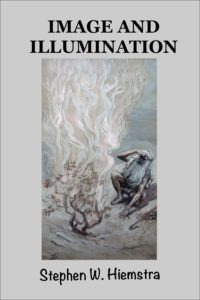Parting Words

And going a little farther he fell on his face
and prayed, saying, My Father, if it be possible,
let this cup pass from me; nevertheless,
not as I will, but as you will. (Matt 26:39)
By Stephen W. Hiemstra
The who question is surprisingly important in understanding the creation account in Genesis and, with it, our understanding of metaphysics, epistemology, and ethics. Anthropology means the study of humanity, but we normally wink at the subject in our rush to uncover more distant truths. But our veiled hearts not only cover our shadow side, they hold the key to interpreting everything else.
Because we are created in the image of God, he is familiar and we immediately recognize him (metaphysics). Because we worship the God who created the universe, we expect the universe to be orderly and worthy of scientific study (epistemology). Because God loves us, we can love those around us who make up God’s family (ethics). Our anthropology is accordingly an interpretive key that colors how we see everything else.
This key, our need for God, often embarrasses us because we deeply desire to be independent. The desire for independence today presents itself as a kind of death wish, as mortality rates in the U.S. rise primarily for preventable reasons: Suicide, drug overdoses, and obesity-related illnesses. Refusing to be vaccinated and wear mask in the middle of a pandemic is just another example. Freedom is nothing left to lose, as Janis Joplin reminded us just before she overdosed.1 If freedom means taking unnecessary risks, are we truly free?
The freedom that matters presents itself as a Gethsemane moment: When confronted with pain, do we turn to God and give it over to him or do we turn into the pain and wallow in it? Our response to these Gethsemane moments big and small define our personalities and, taken together, our cultures because as human beings we have a special relationship with pain. We remember pain more clearly than joy, which is why it defines our personalities. “Was mich nicht umbringt, macht mich stärker.” Nietzsche reminds us.2
True freedom arises not in denial but in accepting our need for God. This is simple, authentic life. Centering on the image of God is not a pain-free existence, but it means that we are prepared for the opportunities that life presents. In following Christ, we are blessed to be a blessing to others and do not compound our griefs with missed opportunities.
Footnotes
1 https://en.wikipedia.org/wiki/Me_and_....
2 What doesn’t kill us makes us stronger. https://en.wikipedia.org/wiki/Twiligh....
Parting Words
Also see:
The Who Question
Preface to a Life in Tension
Other ways to engage online:
Author site: http://www.StephenWHiemstra.net
Publisher site: http://www.T2Pneuma.com
Newsletter at: https://bit.ly/hot_2022, Signup
The post Parting Words appeared first on T2Pneuma.net.



